I thought we were doing a good job. In fact, I was kind of smug about it. As an enthusiastic yellow-top bin recycler, garden composter, worm farmer and soft plastics recycler, my family is well trained in correct recycling protocols.
Our three children have long been schooled on the travesty of filling up landfills. There might have even been occasions when the urge for me to pick recyclable items out of relatives’ kitchen (landfill) bins has proved too strong to resist. But is it good enough to simply feel good about filling up the recycling bin with properly sorted and rinsed-out bottles and containers?
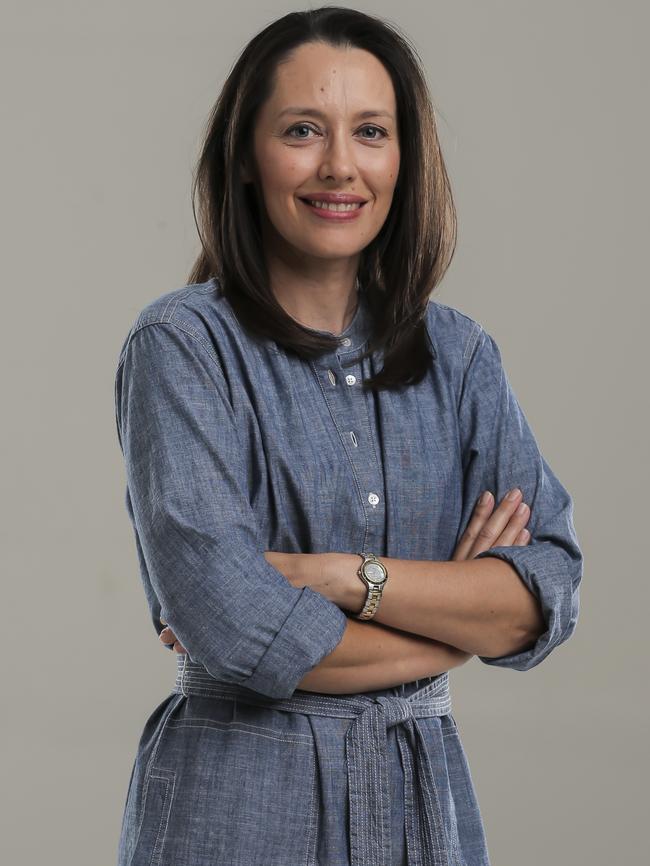
The concept of zero waste living – sending as little as possible to landfill but also sending little (or nothing) to the recycling bin – has steadily been gaining traction. With an ultimate goal of producing no landfill or no recycling, it involves a complete change of thinking in how we purchase goods in the first place.
Zero waste advocates say recycling is far from a perfect solution as it uses energy, resources and costs money. The Plastic Pollution Coalition, an international alliance of businesses, organisations and individuals, believes recycling plastic is not enough as most of the world’s plastic is land-filled, down-cycled, incinerated or exported to other countries. Recycling also does not stem the production of virgin plastic product that is made from petroleum, a non-renewable resource.
Plastic can’t be recycled infinitely and will eventually degrade beyond use and end up in landfill (yes, plastic really is forever). Just because we might “do the right thing” with our recycling doesn’t mean the planet is thanking us.
So while I’ve currently joined the rest of Queensland in hoarding hundreds of single-use plastic bags under the kitchen sink for the Armageddon of the plastic bag ban coming into effect on July 1 (what will we do for bin liners?), it’s also time for a good, hard look at how much rubbish an average family of five produces.
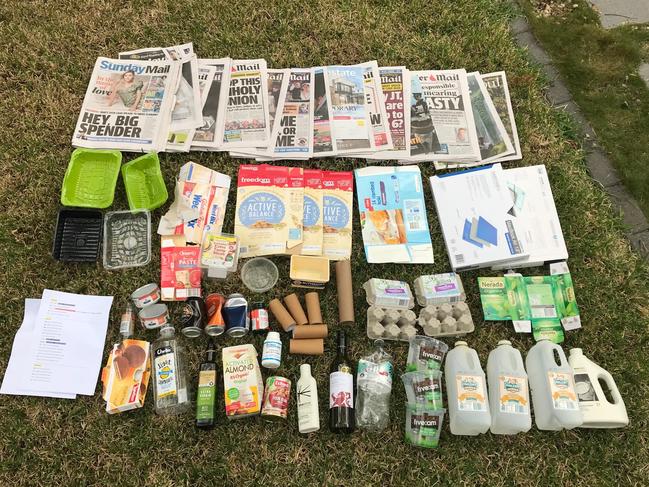
It’s time to upturn the wheelie bins, count the contents and face the facts. And this is what I found: after seven days, there were 54 recycling items lined up on my front lawn (sorry, neighbours). In the landfill bin, there were four (grey, soon-to-be-banned, supermarket-size) bags of non-recyclable rubbish. We also had one full bag of plastic recycling containing 61 pieces of soft plastic.
At that rate, over one year, this adds up to 2808 recycling items – more than 28,000 items over 10 years. We will also produce more than 2000 bags of landfill rubbish and 520 bags filled with 31,720 pieces of plastic to be recycled over a decade. And we are only one family.
Then think about all the things you’ve ever thrown away – the clean-outs and packaging waste from moving house, skips filled to the brim from home renovations, the mounds of “stuff” thrown out in kerbside collections, all the plastic bags you’ve ever bought things in, the takeaway food and drink containers, toiletry items, old plastic toys, the disposable coffee cups …
So how to break the endless cycle of buying and consuming and throwing away? How can we leave a gentler imprint on our planet?
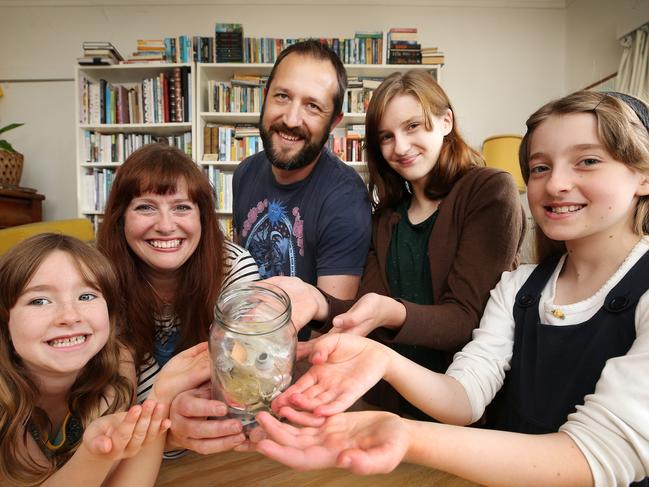
JARRING EXPERIENCE
It’s the ultimate zero waste status symbol. A glass jar on the kitchen bench as your only household waste receptacle. There’s no kitchen bin, no bathroom bin, no office bin. There is only the jar, on display for all to see. Perhaps Australia’s best zero waste achievers are the Carter family of Hobart, Tasmania. They have a glass jar. And their 700ml jar is only three-quarters full. After two years.
Lauren and Oberon Carter, both 42, live on an average suburban block with their three daughters Audrey, 14, Xanthe, 11, and Maisie, 7. In 2015, the family entered a challenge set by not-for-profit group Sustainable Living Tasmania, and went completely waste and recycling-free for the two-week event. But after winning the challenge, they continued. The family went from producing 100 pieces of recycling and about 100 pieces of landfill rubbish a week to none.
They ditched buying food in packets to buying products in bulk in reusable bags or containers. They shop at farmers’ markets, they have chickens, they go fruit-picking as a family outing. They go to a nearby dairy to buy milk in returnable glass bottles. The family didn’t eat cheese for a year until they found a way to purchase it without plastic packaging. Tinned tuna is one of the few items they now do not consume at all.
Any paper or cardboard products brought into their home end up in their fireplace or used as sheet mulch in their garden. They make a multitude of products from scratch, including toothpaste, deodorant, hair wax and cleaning spray. Even their clothing is plastic-free (so no polyester) and is instead made from wool, cotton or bamboo, which will eventually be turned into rags for cleaning and then sheet-mulched in the garden for weed control. “When we buy things we look at lastability and repairability,” Oberon, an ecologist, says. “We buy shoes we can repair rather than shoes with moulded soles that you can’t fix. Zero waste seeps into all of our purchases.
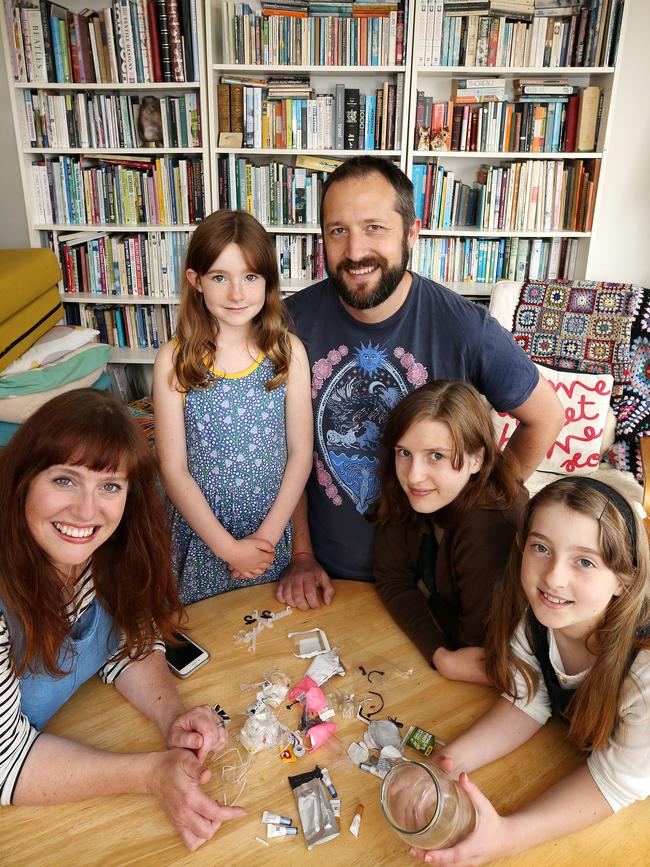
“Ideally, society will get to a point where the way we are living is not seen as freakish or newsworthy but is the norm and widely accepted. But there are little ways that zero waste concepts are infiltrating the broader populace. Reusable keep cups are becoming normalised and there’s Plastic Free July that was started in Perth (and now involves more than two million people in 150 countries).
“People think there are no negative impacts from recycling, but it still uses a lot of resources and there are very few products you buy that are actually made of recycled plastics. It’s a positive thing that China stopped taking our recycling because it made Australia realise it has a responsibility for the waste that it produces. [In January, China stopped accepting recyclables and other waste from foreign countries including Australia due to high levels of contamination.] It’s not OK to send it away and make it someone else’s problem.”
Lauren Carter, who home-schools the couple’s daughters and runs an online zero waste store and education site called Spiral Garden, says the family’s weekly budget has remained the same.
“We have saved a lot of money from buying in bulk, picking fruit, growing our own, and we always start out looking for second-hand,” she says. “Some of the handmade products we buy are more expensive but it balances out. Some things are way cheaper. For example, toothpaste now costs $1 to make ourselves.”
The family’s glass jar “bin” has various small bits of non-recyclable items such as stickytape, plastic tabs from second-hand clothing purchases, a few tabs from inside the lids of vitamin bottles, packaging from medicinal items, as well as a “few tiny oddments”.
Oberon says they have also thrown out a few items from “before”, such as an old plastic toy that couldn’t be sold or traded or repurposed and so went to landfill.
“We wouldn’t choose to buy that sort of thing again,” he says. “Waste occurs everywhere and we still produce it. We still drive a car and expend energy in different ways. We’re still consuming resources.
“But we don’t keep any bins in our house and we haven’t had a bin since that 2015 challenge. Anything that’s in the glass jar is from things we’ve bought and chosen since living waste free and that’s all there is.
“It sits on our bench like a visual reminder.”
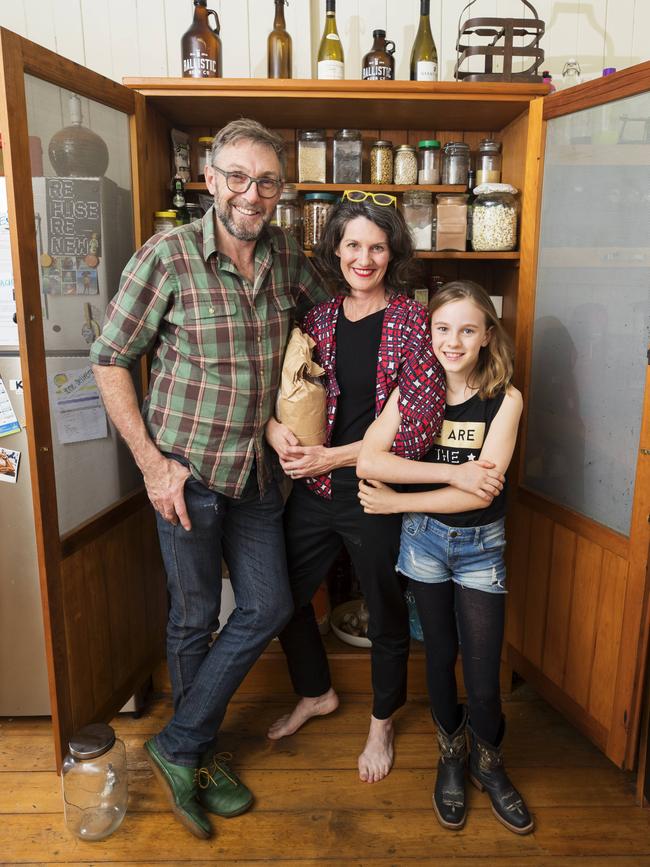
A FAIRER FOOD SYSTEM
Brisbane couple Rob Pekin and Emma-Kate Rose, of Salisbury, in the city’s southwest, have four children between them (Joseph, 17, Dougall, 16, Darcy, 15, and Elsie, 9) and also embrace a zero waste philosophy in their household. They produce one small bag of rubbish every fortnight and a small amount of recycling (mostly Pekin’s cans of craft beer). But their passion for waste-free living goes beyond their own home. They run Food Connect, a social enterprise founded by Pekin in 2005.
Pekin, an ex-dairy farmer who was forced off his land in Colac, western Victoria, in the late 1990s as a casualty of the deregulation of the Australian dairy industry, was at one stage homeless and living in the Tasmanian bush for six months. He established Food Connect to create a fairer food system. The concept allows payment to go directly to the growers for fresh fruit, vegetables, dairy and other perishables that travel no more than 400km to the customer’s door.
They now have more than 3500 customers in the Brisbane area and farmers are paid about four times the amount they would receive from major supermarket chains. Pekin, 55, and Rose, 48, have established a “food hub” with commercial kitchen (including a cold room and fermenting room) that they rent out to various food producers of bread, jam, miso, tempeh, chilli sauces, spice rubs and healthy organic treats as “a real community of sharing, co-working and utilising each other’s waste”.
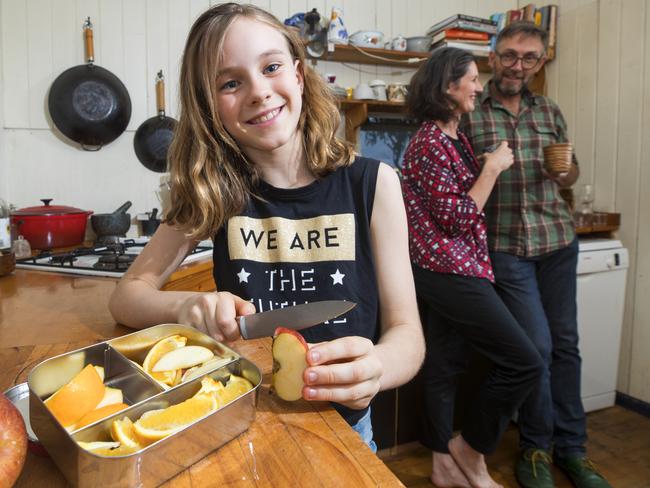
“We share vehicles and rent them out and there’s a share shed which is a tool library … so instead of buying tools you can rent tools, as well as golf clubs, canoes and all sorts of things.
“The commercial kitchen is quite a big space (100sqm) and we’re adding to that because we’ve got all sorts of people who have businesses around food waste who want to join the family.”
In their home, Pekin admits they are not “purists” but says they are focused on reusing and not wasting, and he advocates “getting as close as possible to the source of your food”. They take their own containers to bulk-buy food stores, buy big blocks of soap that are cut up at the store counter and buy cheese in 25kg bulk boxes that are cut into 1kg blocks and stored in a chest freezer.
They compost all fruit and vegetable scraps (that can’t be used to make vegetable stock), make their own dog food and do “lots of pickling, fermenting and preserving”. They use beeswax wraps instead of plastic wrap, make their own yoghurt, darn their socks and go to clothes swaps. Any containers that do find their way home are used to store “bits and bobs, buttons, nails, bolts”.
“We’re committed to cooking a lot of our own food, making soups, casseroles, pies and stews to use up the produce in the bottom of the crisper,” Pekin says. “We all know ‘reduce, reuse, recycle’ but we say there is only one – reduce. Only after you have exhausted all efforts to reduce do you reuse or recycle.”
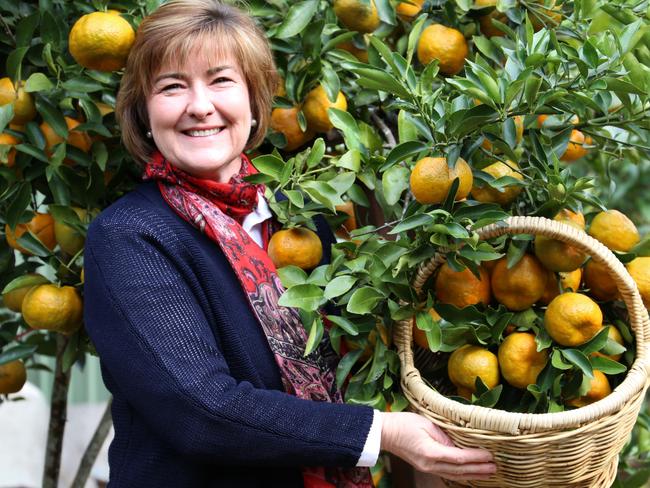
The no-waste philosophy and share economy has also been embraced by Sunshine Coast social enterprise Spare Harvest. Started by Helen Andrew, 51, of Coes Creek, it now has almost 2000 members who exchange, share or sell items including seasonal gluts of produce, glass jars, leftover pantry and fridge items, food scraps, kombucha scobies, jams, nuts, even spare time (a teenager earned some pocket money by helping in a garden).
“I created a simple and easy way for people to reduce their food and garden waste by sharing it with someone who will use it,” Andrew says. “When organic matter hits landfill, it produces toxic greenhouse gases, particularly methane and this is more toxic than carbon dioxide. If we can find other people who will use our waste, it does not end up in landfill and continues to be a valuable resource. One person’s trash is another’s treasure.”
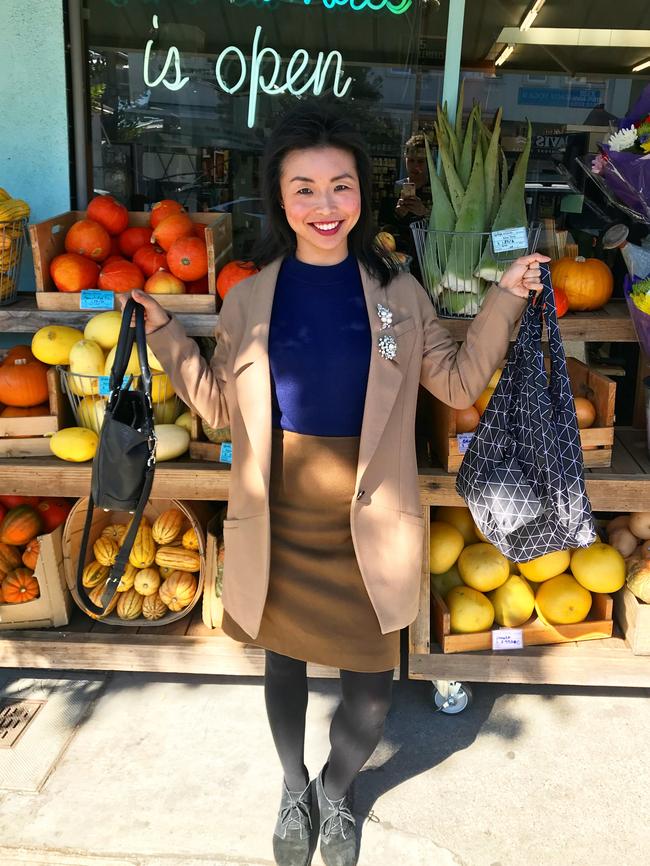
GREENER AND CLEANER
Australia’s largest local government authority, Brisbane City Council, has a waste minimisation and management strategy as part of its Our Living in Brisbane 2026 vision, called Towards Zero Waste. Recently it announced plastic straws, balloons and single-use plastic bottles would be banned from supply at council events.
But the idea of embracing zero waste, the BCC states, requires a “significant behavioural shift”. Residents will need to buy “greener” and industries manufacture “cleaner” to reduce our traditional reliance on landfill. Accordingly, BCC has set goals for reducing the volume of waste disposed of at landfill and reducing the amount of recyclables lost in general waste. “The preferred option is not to have any waste at all,” it states. “The best method of not having waste is to control it with the way we buy things. Our consumer society needs to change to a conserver society.”
Several books on how to live with less waste have been published, including A Zero Waste Life in Thirty Days, a practical guide to “radically reducing your waste by 80 per cent”, by Anita Vandyke, and Waste Not: Make a Big Difference by Throwing Away Less, by Melbourne blogger Erin Rhoads.
Chinese-born, Australian-raised Vandyke, 32, a qualified rocket scientist, medical student and blogger, who lives between Sydney and San Francisco, writes that there’s a new kind of environmentalist – the “everyday activist”.
“Being an everyday activist is about valuing small and consistent actions … small changes can make a big cumulative difference,” she says. “We dump our rubbish on the planet as if there is endless space for landfill. Zero waste living relies on individual actions making a cumulative difference. Zero waste is the goal, but your lifestyle doesn’t have to be perfect to make a big difference.”
Vandyke suggests starting out by doing a bin audit to examine your buying habits and identify the “frequent flyers”. The “big four” – single-use water bottles and plastic bags, plastic straws and takeaway coffee cups – can easily be replaced with reusable versions. “Shoppers worldwide use 500 billion single-use shopping bags per year – that’s about a million bags per minute across the globe,” Vandyke says. “Every piece of plastic created since the 1950s still exists.”
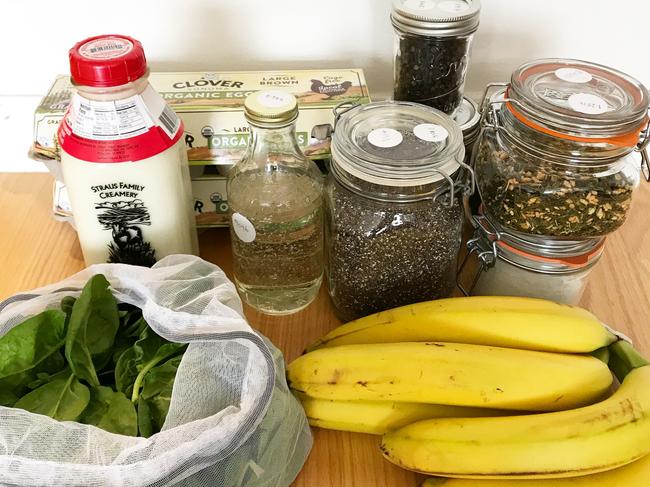
With Queensland’s looming single-use plastic bag ban from July 1, there has been much discussion about bin liners. What will we do? Will we all have to buy plastic bin bags and negate the whole save-the-planet exercise?
Alternatives include plastic-free compostable bin bags made from corn or lining bins with newspaper (by composting fruit and vegetable material, “bin juice” will be eliminated).
But the “ultimate zero waste status symbol”, Vandyke writes, is to get rid of your kitchen bin altogether. Enter the glass jar.
While I might be “doing my bit” with fervent recycling efforts, I have discovered this is probably still not enough. And so with a new, mindful attitude towards packaging and the amount of plastic waste and recycling items we generate each week, I’m off to the local bulk-buy store with my reusable produce bags. One day there might even be a glass jar on my bench. ■
plasticfreejuly.org
Woolworths begins its single-use plastic bag ban from June 20; Coles from July 1
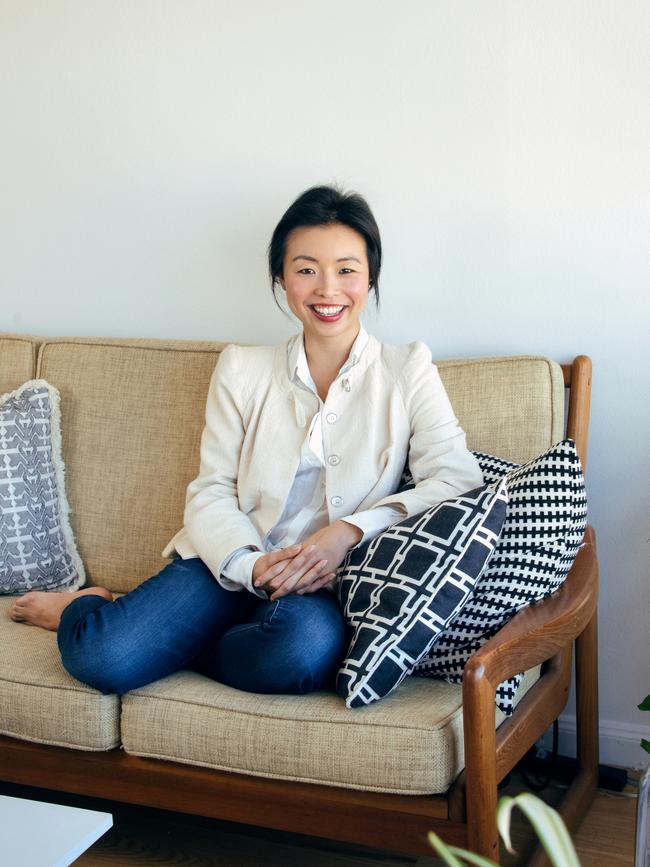
HOW TO REDUCE YOUR WASTE
● Carry a “zero waste kit” – a reusable bag with a good-quality glass or metal drink bottle, keep cup (that can also be used for snacks on the go), stainless steel straw, cloth napkin and reusable cutlery kit.
● Avoid food packaging. Take your own containers to butchers and fishmongers. Buy produce (nuts, grains, flour) from
a bulk-buy store, taking reusable bags and containers to transport goods home.
● Eat what is in season and avoid food waste by using up what you have. Don’t buy more than you need.
● Visit your local farmers’ market. Consider an organic food delivery service that allows you to return the box.
● Set up a backyard compost bin or take fruit and vegetable scraps to a local community garden, school, nursery or wherever there is communal compost.
● Use a worm farm. Worms produce rich fertiliser faster than normal composting
(but remember, no animal products or citrus). For animal products such as cheese, bones and meat, a special bin (bokashi bin) accelerates fermentation
and produces a liquid fertiliser.
● Buy compostable bin liners, use newspaper to line your bin, or go the whole hog and ditch the bin for a glass jar.
● No new stuff. Put yourself on a one-month spending ban of clothing, shoes, makeup, skincare. No shopping as a social activity. Borrow books instead of buying.
● Use up beauty and cleaning products, then replace with package-free options (eg, shampoo bar). Experiment making your own products. Use rags made from old T-shirts or towels or a cotton washcloth.
● Don’t buy fast fashion brands. Make second-hand your first choice.
● Consider eating less meat and have one meatless day a week.
● Bring your own food on plane flights.
● Make your own cloth napkins from upcycled fabric to replace paper towels.
From A Zero Waste Life in Thirty Days by Anita Vandyke (Penguin Random House Australia, $20 PB), published July 2; anitavandyke.com
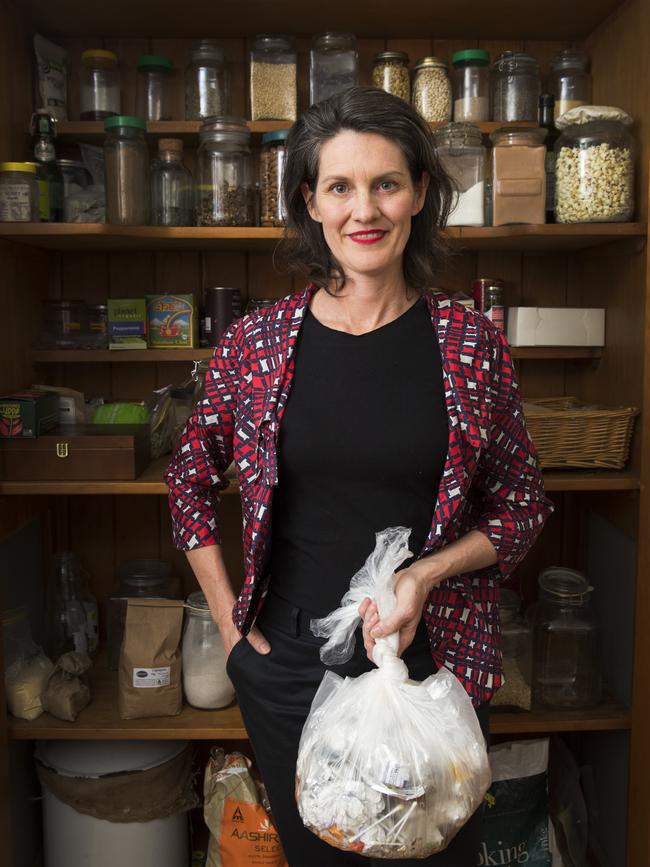
WHAT THE BAN MEANS
The Queensland Government will enforce a statewide ban on single-use plastic bags from July 1.
Which bags will be banned?
Retailers are no longer able to supply single-use lightweight plastic shopping bags less than 35 microns in thickness to customers, for free or at a charge. This includes compostable, degradable and biodegradable bags as they break down in the environment in the same way as conventional plastic shopping bags and can still harm the environment and wildlife.
Which bags will NOT be banned?
Some plastic shopping bags and other types of plastic bags are not included in the ban. This includes:
- barrier bags for unpackaged perishable food such as fruit, vegetables, meat and fish
- bin liners and garbage bags
- single-use heavy weight department store plastic bags
- plastic nappy bags
- dog poo bags
Source: qld.gov.au/environment/pollution/management/waste/plastic-bags/shoppers
SUPERMARKET WARS
This month, Coles released new food waste and packaging commitments including reduced plastic wrapping of fruit and vegetables. It pledges to make all Coles brand packaging recyclable by 2020, have 90 per cent of all waste to be diverted from landfill by 2022 and to halve food waste by 2020 by donating unsold edible food to people in need and using food waste for animal feed, fertiliser and compost.
Woolworths stores will no longer sell plastic straws by the end of 2018, saving 134 million plastic straws from going into circulation each year. It will also trial the removal of plastic packaging on a further 80 lines over the next year and sell a new reusable shopping bag with a lifetime replacement offer.

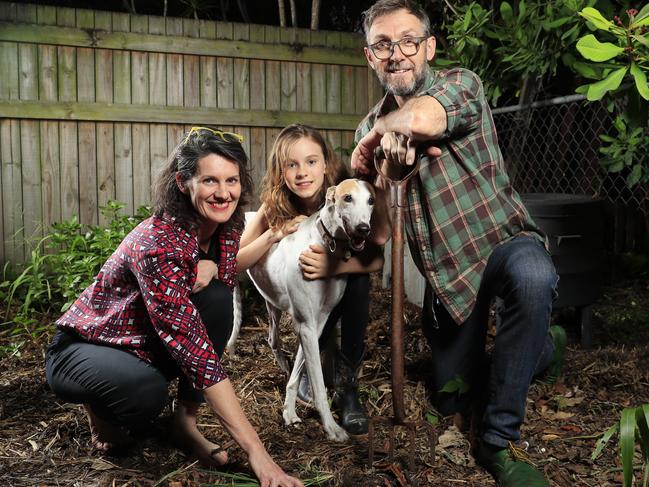
Add your comment to this story
To join the conversation, please log in. Don't have an account? Register
Join the conversation, you are commenting as Logout
Brisbane’s most stylish: Meet our best dressed A-listers
We scour the city every week to find the most stylish guys and gals for our A-list. Find out which trendsetters made this month’s best dressed list.
The ultimate late-night wedding snack
Wedding guests can get very hungry after a day of celebrating. This bride and groom had McDonald’s on speed dial to deliver 120 cheeseburgers at the end of the night.